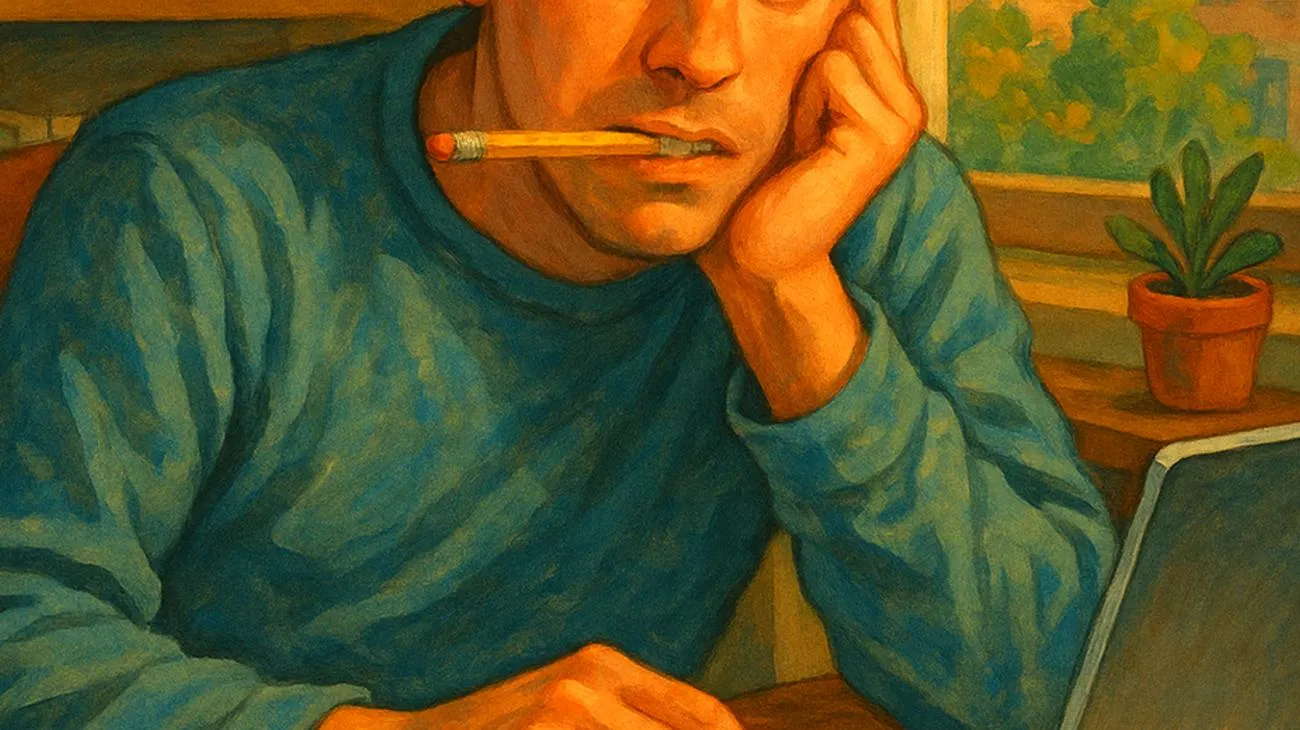The Weird Psychology Behind Your Pencil-Chomping Habit That You Never Knew About
Picture this: You’re sitting at your desk, completely absorbed in work or study, when you suddenly realize you’ve been gnawing on your pencil like it’s some kind of wooden snack. Sound familiar? If you’re one of those people who treats writing instruments like chew toys, you’re definitely not alone – and there’s actually some pretty fascinating psychology behind this quirky habit that goes way deeper than you’d think.
Before you brush off your pencil-biting as just another weird quirk, here’s the plot twist: behavioral psychology experts have discovered that repetitive behaviors serve as unconscious coping mechanisms for stress and emotional regulation. This seemingly innocent habit is actually your brain’s sneaky way of dealing with anxiety and the chaos of modern life. Who knew your subconscious was so clever?
Your Brain’s Secret Stress-Busting Strategy
Here’s something that’ll blow your mind: when you’re chomping down on that poor pencil, you’re actually engaging in what experts call a self-soothing coping mechanism. It’s like your brain has its own built-in stress management system, and that pencil just happens to be the perfect tool for the job.
The magic happens through something called sensory regulation. When you’re feeling stressed, anxious, or just plain overwhelmed, your nervous system starts frantically searching for ways to calm down. The rhythmic motion and tactile sensation of chewing provides exactly the kind of sensory input your brain needs to hit the reset button on stress.
It’s pretty incredible when you think about it – without any conscious effort, your brain figured out that a little oral stimulation could help manage those cortisol levels and bring your stress response back down to earth. Your subconscious is basically running its own wellness program, and pencils are apparently the equipment of choice.
The Concentration Connection That’ll Change How You Study
Ever notice how your pencil-munching habit kicks into high gear when you’re trying to solve a particularly tricky problem or focus on something super important? That’s not coincidence – that’s your brain being absolutely brilliant at optimizing itself for peak performance.
Clinical observations show that certain repetitive behaviors can actually enhance focus and concentration by providing what specialists call proprioceptive input. Basically, your brain is getting just enough sensory information to help filter out all the distracting noise around you and laser-focus on the task at hand.
It’s similar to how some people need to pace around when they’re thinking, or how certain students swear they can only study effectively with music playing in the background. Your brain is essentially creating the perfect sensory environment for deep concentration, and that innocent pencil is playing a starring role in your personal focus formula.
For people juggling multiple languages, complex work projects, or intense study sessions, this kind of unconscious focus-enhancement strategy makes total sense. Your brain is working overtime to process information, and it’s found a surprisingly effective way to stay sharp and attentive.
The Neurodivergent Brain Factor
Here’s where things get really interesting: for individuals with ADHD or other neurodivergent conditions, pencil biting often serves an even more crucial function. Experts in developmental psychology have observed that these repetitive oral behaviors help manage sensory overwhelm and provide the additional stimulation that neurodivergent brains often crave to maintain optimal focus.
The behavior essentially acts like a volume control for your brain’s sensory processing center. When everything feels too intense or chaotic, that rhythmic chewing helps dial things back to a more manageable level. When your brain needs more stimulation to stay engaged, the oral input provides exactly the right amount of sensory fuel.
This is particularly relevant in fast-paced environments where sensory input can be intense and overwhelming. Your brain might be using pencil chewing as a way to maintain equilibrium in a world full of constant stimulation and demands.
Your Inner Child’s Comfort-Seeking Mission
Ready for a psychology deep-dive that connects your current habits to your baby self? That urge to put things in your mouth when you’re stressed or thinking hard actually connects back to some of our most fundamental comfort-seeking behaviors from infancy.
From the moment we’re born, oral activities provide comfort and security. Nursing, pacifiers, even thumb-sucking – these behaviors create powerful associations between oral stimulation and emotional safety. While most of us outgrow the obvious versions of these habits, the underlying psychological need for oral comfort can stick around in more subtle forms.
Psychology specialists explain that self-regulation behaviors tap into deep-seated associations between repetitive actions and emotional comfort. When you’re facing uncertainty, stress, or cognitive challenges, your brain unconsciously seeks out familiar patterns of self-soothing. And there’s that trusty pencil, ready and willing to provide the oral stimulation your nervous system is craving.
It’s actually pretty amazing how our brains maintain these connections throughout our lives. That pencil isn’t just a writing tool – it’s become a bridge to the fundamental comfort and security strategies that helped us navigate the world as tiny humans.
The Perfectionist’s Secret Weapon
Here’s something that might surprise you: clinical observations suggest that pencil biting is particularly common among people with perfectionist tendencies or sky-high achievement standards. This makes perfect sense when you consider the psychological pressure cooker that comes with constantly striving for excellence.
Perfectionists don’t just complete tasks – they’re simultaneously monitoring their performance, anticipating potential problems, maintaining impossibly high standards, and probably overthinking every single detail. This mental juggling act creates the perfect storm of stress and concentration demands, making self-soothing behaviors like pencil biting almost inevitable.
In achievement-oriented cultures, where academic and professional success are highly valued, this connection becomes even more relevant. The pencil-biting habit serves as a pressure valve, allowing high-achievers to manage their anxiety while still maintaining laser focus on their ambitious goals.
Think of it as having a stress-management app running in the background while your conscious mind stays completely focused on crushing those deadlines, acing those exams, or delivering that perfect presentation.
Decoding Your Personal Pencil-Biting Pattern
Not all pencil biting is created equal, and paying attention to your specific patterns can reveal different things about your psychological state. It’s like having your own personal stress barometer that you can learn to read and understand.
Light, occasional chewing during creative thinking sessions might indicate that you’re using the behavior as a focus enhancement tool. More intense or persistent biting during stressful situations could suggest that your nervous system is working overtime to manage anxiety or overwhelm.
The timing matters too. If you find yourself reaching for that pencil specifically during challenging conversations, difficult problem-solving sessions, or high-pressure situations, it’s a pretty clear sign that your brain has identified this as an effective coping mechanism for emotional regulation.
Some people notice their pencil-biting intensifies during specific types of tasks – maybe complex mathematical problems, creative writing, or detailed planning. Others find the habit kicks in during social situations where they feel anxious or uncertain. Understanding your personal triggers can provide valuable insights into your stress patterns and emotional needs.
When to Pay Closer Attention
While pencil biting is generally harmless from a psychological perspective, there are times when it might warrant closer attention. If the behavior becomes so intense that it’s causing dental problems, or if it’s accompanied by other signs of significant stress or anxiety, it might be worth exploring healthier alternatives or addressing underlying stress factors.
Persistent, compulsive chewing behaviors can sometimes indicate underlying sensory processing needs or heightened anxiety levels that could benefit from professional support or alternative coping strategies. The key is recognizing when a helpful habit crosses the line into something that might be causing more harm than good.
Upgrading Your Stress-Management Toolkit
Understanding the psychology behind pencil biting is fascinating, but the real power comes from using this insight to develop even more effective stress-management and focus-enhancement strategies. There are several alternatives that can provide similar benefits without turning your writing instruments into chew toys.
- Sensory alternatives: Stress balls, fidget toys, or textured objects can provide similar sensory input without hygiene concerns or potential dental issues
- Breathing techniques: Deep breathing exercises can provide the same nervous system regulation benefits while also improving oxygen flow to your brain for better cognitive performance
- Progressive muscle relaxation: This technique helps address the physical tension that often accompanies the psychological states triggering pencil biting
- Mindfulness practices: Developing awareness of your stress triggers can help you implement coping strategies before the pencil-biting urge kicks in
- Environmental modifications: Creating optimal study or work environments can reduce the overall stress load that makes self-soothing behaviors necessary
The Bigger Picture of Your Psychological Landscape
The truly fascinating thing about pencil biting is that it’s rarely just about the pencil. It’s actually a window into your unique psychological landscape – revealing how you handle stress, what your brain needs to maintain focus, and what comfort-seeking strategies you’ve unconsciously developed over time.
By paying attention to these seemingly small behaviors, you can gain incredibly valuable insights into your emotional regulation patterns, stress responses, and cognitive needs. This self-awareness becomes a powerful tool for developing more intentional, effective strategies for managing whatever challenges life decides to throw your way.
In our fast-paced, high-pressure world, understanding these subtle psychological signals becomes even more important. Whether you’re navigating academic pressures, career demands, or just the general stress of modern life, recognizing how your brain naturally tries to help you cope can be the first step toward developing even better strategies.
Remember, there’s absolutely nothing wrong with pencil biting as a coping mechanism. It’s actually quite ingenious how your brain figured out this simple, accessible way to manage stress and enhance focus. The real power lies in understanding what it represents so you can make conscious choices about how to best support your psychological well-being.
So the next time you catch yourself reaching for that pencil like it’s a stress-relieving snack, take a moment to appreciate the sophisticated psychological processes at work behind the scenes. Your brain is doing its absolute best to help you navigate a complex world, one small bite at a time. And now that you understand the hidden psychology behind the habit, you’re better equipped to support those efforts in whatever way works best for your unique needs and circumstances.
Table of Contents

